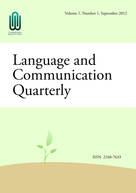


Volume 10 Issues 1-4 (2021-12-31)
Volume 9 Issues 1-4 (2020-12-31)
Volume 8 Issues 1&2 (2019-06-30)
Volume 7 Issues 3&4 (2018-12-31)
Volume 7 Issues 1&2 (2018-06-30)
Volume 6 Issues 3&4 (2017-12-31)
Volume 6 Issues 1&2 (2017-06-30)
Volume 5 Issues 3&4 (2016-12-31)
Volume 5 Issues 1&2 (2016-06-30)
Volume 4 Issues 3&4 (2015-12-31)
This study investigated the impact of fourth grade students’ gender, socio-economic status, disability status, and district of location on their fourth grade New York State English Language Arts (ELA) and Mathematics Assessment scores. Specifically, this study examined if a) there was a significant relationship between students’ ELA and mathematics scores; b) there were significant gender, socio-economic status, and disability status effects on their fourth grade ELA and mathematics scaled scores; and c) what are the significant predictors of their ELA scaled scores? The results show that there was a strong positive relationship between students’ ELA and mathematics scores; further, there were significant gender (p < .001), disability (p < .01), and gender by disability (p < .05) interaction effects on students’ ELA scores. However, socio-economic status, as well as any of the interactions, revealed no significant effect on ELA scores; and finally, gender (p < .01), disability (p < .05), and Math scores (p < .001) were all significant predictors of students’ ELA scores.
This empirical study examined the implementation, possibility of task-based language teaching (TBLT) to primary English teaching and the problems and countermeasures in the application of TBLT. It first explores the possibility of TBLT to primary English teaching. The results suggest that TBLT offers students abundant input; further, students’ motivation, interests, and confidence in learning have been developed in finishing the real tasks. This study also indicates the considerable challenges in implementing TBLT in Chinese primary schools. Important implications for English teachers to use TBLT in primary English classrooms are proposed.